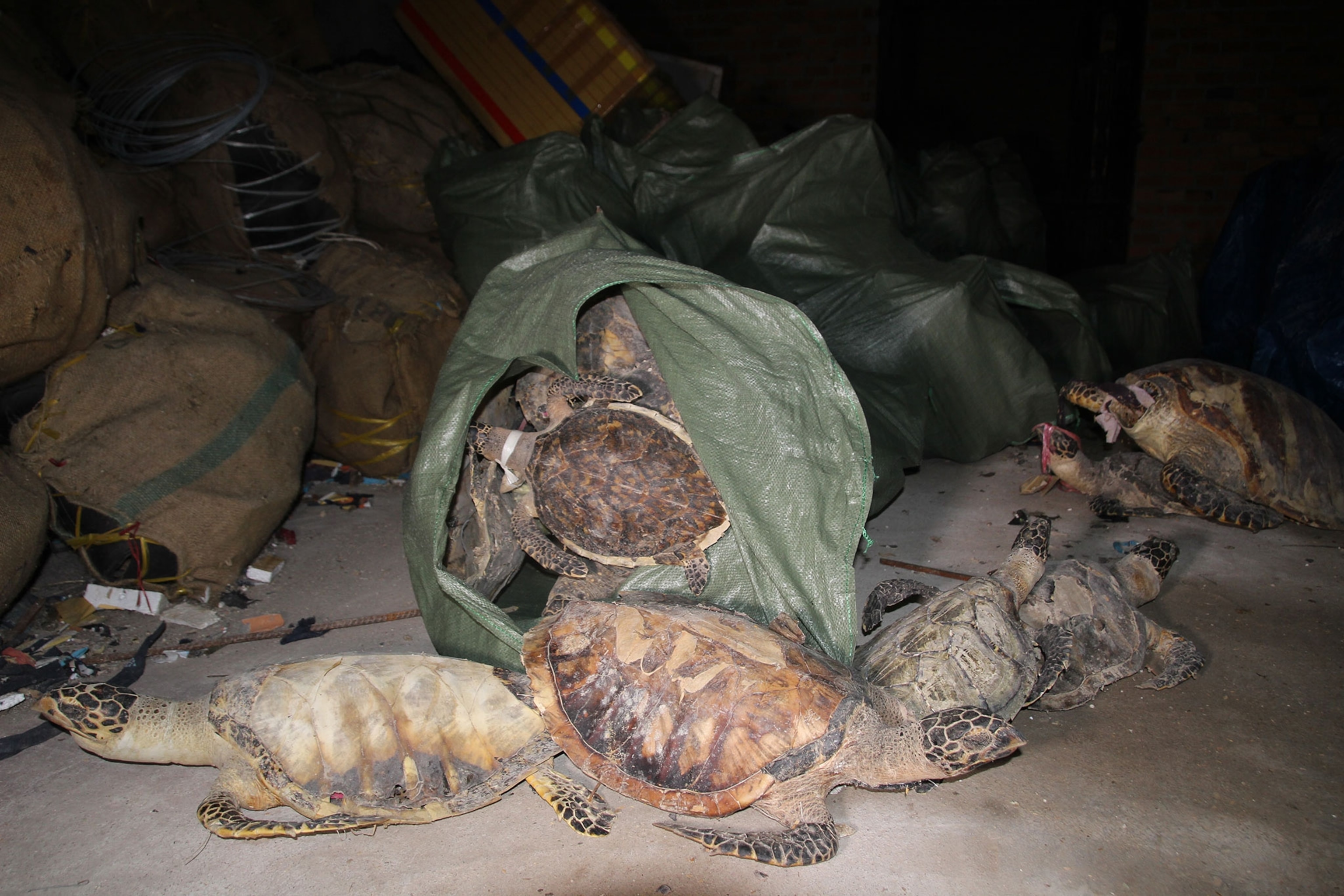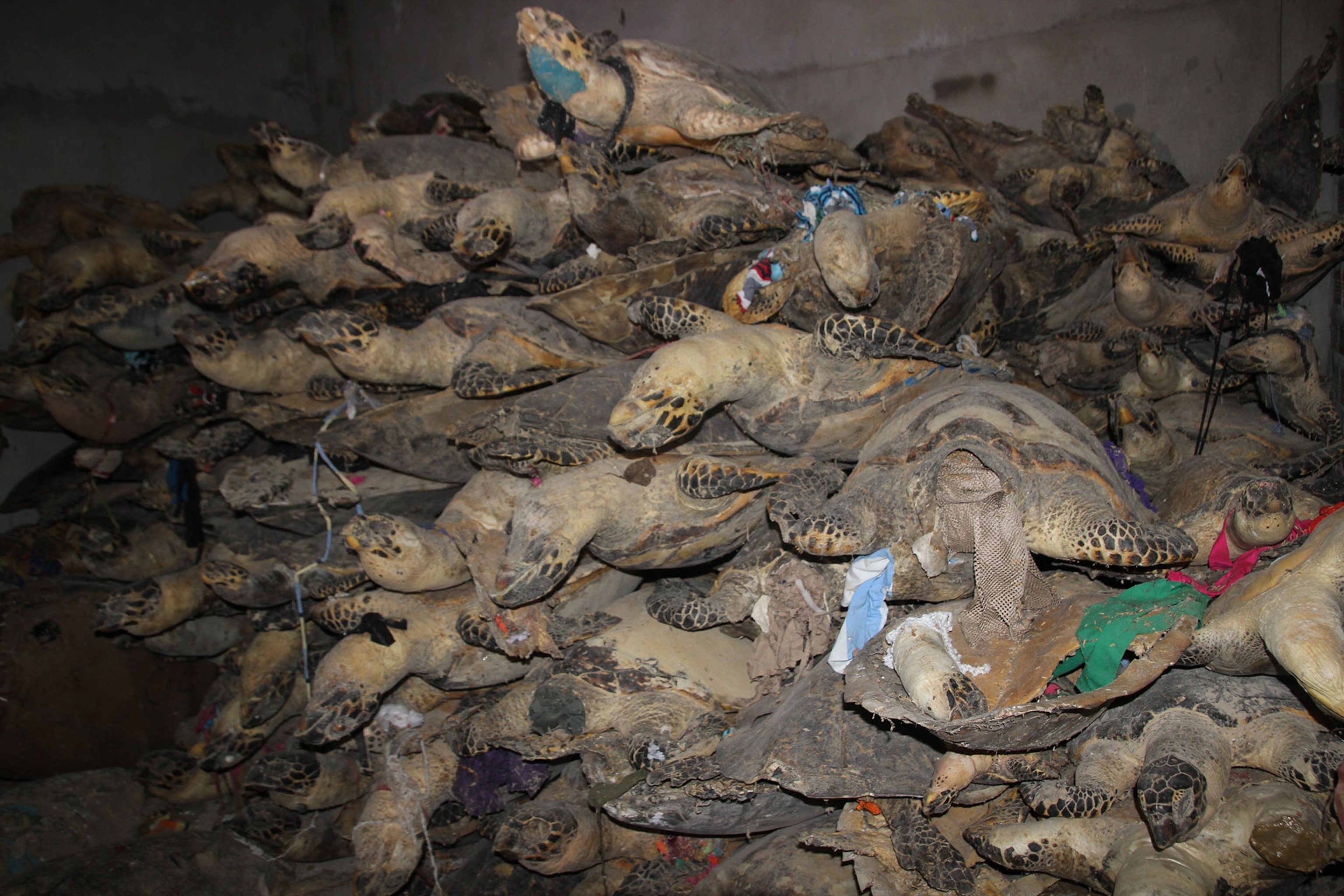
Turtle Trafficker Sentenced, But Suspected Mastermind Still Not Charged
Vietnamese man trading endangered hawksbill turtles was sentenced to more than four years in prison. The alleged kingpin has yet to be brought to justice.
More than three years after he turned himself in to authorities, a Vietnamese man convicted of trading critically endangered sea turtles has been sentenced to four years and six months in prison. It’s one of the toughest penalties imposed in recent years under Vietnam’s wildlife laws, says Bui Thi Ha, vice director of the nonprofit organization Education for Nature-Vietnam (ENV), which had long been pursuing the case.
“We’re quite happy with the result,” Ha says. “We haven’t seen this long of a sentence in a very long time.”
The sentencing of Hoang Tuan Hai this week stems from the 2014 discovery of some 7,000 fully or partially taxidermied sea turtles at warehouses and a farm in a rural area outside Nha Trang, a beach town about 250 miles from Ho Chi Minh City. ENV says it’s the largest confiscation of sea turtles to date. Giant clams, also threatened with extinction, were seized by police as well.
At his trial, Hai said he didn’t buy the turtles but exchanged alcohol, beer, and cigarettes for them and that he wasn’t aware that his actions were illegal, according to Vietnamese media. Ha says that Hai denied selling the turtles, but that the evidence showed he was storing them for a commercial purpose. A top investigator with ENV previously told Wildlife Watch that the turtles were allegedly destined for China, to be sold as trophies.
Hai faced a maximum prison sentence of seven years. The penalty imposed by the People’s Court in Nha Trang is in line with the four to five year prison sentence Ha said that the prosecution recommended.
Hawksbill turtles, found throughout the tropical waters of the Atlantic, Pacific, and Indian oceans, made up the vast majority of the dead turtles discovered by police. Given that hawksbills are already critically endangered, the removal of thousands of them was likely devastating for the population, Ha says. They’re losing coastline and coral reef habitat to development, climate change, and other threats, as well as being slaughtered en masse for their “tortoiseshell” carapaces. It’s illegal in Vietnam to kill, sell, or export hawksbills.
“We don’t know from 2010, from the time Hai operated, how many turtles [have] been processed and sold to China already, so this must have had a huge impact on biodiversity,” Ha says.
In an effort to protect sea turtles, ENV began looking into the possibility of an organized crime ring targeting them. The issue grabbed the organization’s attention in 2011, when a fishing boat carrying some 200 dead turtles was seized in Philippine waters. Several more boats were discovered soon after—all with turtle carcasses on board and all registered to Vietnam, at the port of Sa Ky in the province of Quang Ngai.
So the team headed to Quang Ngai, where—posing as buyers, sellers, or students conducting research—they discovered a group of turtle divers and spoke to black market traders who buy the animals. Eventually they were led to the Nha Trang warehouses, where, a top investigator previously told Wildlife Watch, the air reeked of chemicals and death, and the sea turtles were stacked like pancakes from floors to ceilings.
“This sentencing represents a significant victory for sea turtle conservation in Vietnam and the wider region, and we’re grateful to everyone who has worked tirelessly to secure this outcome,” says Earl Possardt, who heads the Marine Turtle Conservation Fund for the U.S. Fish and Wildlife Service, which provided financial support for ENV’s initial investigation.

Hai’s sentencing comes nearly two years after the Wildlife Watch story, which noted that law enforcement officers had yet to arrest any suspects in the case, despite a confession by Hai shortly after the 2014 bust. The story also detailed how Vietnamese authorities had failed to follow up on leads pointing to a wealthy local businessman ENV suspects masterminded and ran the trafficking operation. ENV believes that Hai, a subordinate, came forward to protect the other man—who still hasn’t been arrested.
Head Trafficker Still At Large?
For conservationists, the hawksbill case has come to serve as a litmus test for Vietnam to prove its seriousness in tackling the illegal wildlife trade.
Vietnam plays a key role in the wildlife black market—a multibillion-dollar-a-year global industry that’s wiping out animals and plants and taking the lives of those who protect them—as a supplier, consumer, and transit country for illicit animal products moving from greater Southeast Asia into China. In early 2014 Prime Minister Nguyen Tan Dung publicly stated his intention to dismantle organized criminal trafficking of protected animals. Conservationists argued that the failure to investigate the suspected sea turtle kingpin and to arrest Hai showed a lack of commitment to that goal.
Hai’s stiff sentence gives Ha hope. “It shows the determination of the court and prosecution in particular to address wildlife crime,” she says. “It tells us we have good people within the government.”
But she’s frustrated that the police haven’t been more aggressive in pursuing the other man, even though ENV’s investigation revealed him to be the top trader. In 2016 several sources told Wildlife Watch of his involvement, including that the warehouses belonged to him and that he’s a well-known buyer of sea turtles. (In 2009 he was fined about $500 as “administrative punishment” after authorities seized nearly 850 live sea turtles from a fish farm in Nha Trang.)
Vietnam rarely prosecutes high-level illegal wildlife traders, though poachers, smugglers, and middlemen are frequently caught and punished. The country is less likely to prosecute people with influence, Ha previously told Wildlife Watch. Representatives from Vietnam’s agriculture and environment agencies didn’t respond to interview requests.
“They don’t want to go deeper,” Ha says, referring to the police, who, she says, conducted only a surface-level investigation of the alleged top trafficker. “They think arresting Hai is good enough. We know this is not enough.”
But, says Douglas Hendrie, director of ENV's wildlife crime and investigations unit, there’s evidence that the 2014 seizures scared off the sea turtle poachers in Quang Ngai. He notes that only one fisherman in the port is still diving for them.
Rachel Nuwer contributed reporting to this story.